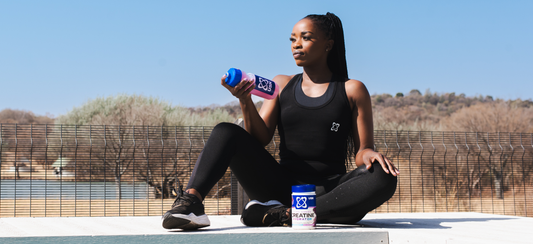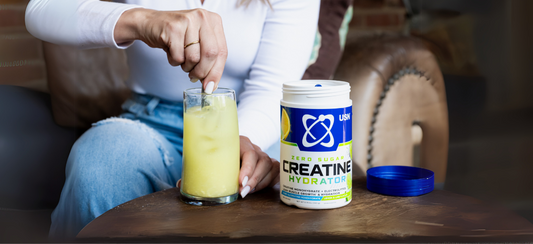-


ADD 2 X 300G TO YOUR CART & SAVE 17%
Pure Creatine
Regular price From R 219.00Regular price Sale price From R 219.00Unit price per -
3-in-1 Creatine Monohydrate & Aminos
Regular price R 189.00Regular price Sale price R 189.00Unit price per -
Creatine Transport
Regular price R 189.00Regular price Sale price R 189.00Unit price per -
Zero Sugar Creatine Hydrator
Regular price R 299.95Regular price Sale price R 299.95Unit price per -
Creatine HCl
Regular price From R 139.00Regular price Sale price From R 139.00Unit price per -
Creatine X4
Regular price R 399.95Regular price Sale price R 399.95Unit price per
Frequently Asked Questions
What is creatine?
Creatine is created from amino acids and is primarily found in your body's muscles and the brain. Creatine is a combination of three amino acids: arginine, glycine, and methionine. Your body produces creatine through your liver and kidneys after you eat protein. Even though creatine is found naturally in your body and certain foods, such as red meat, chicken and fish, you would have to eat an excessive amount of these proteins to receive the quantity available in most creatine supplements.
What does creatine do?
Let’s go back to the basics: to understand how crucial creatine is to your body and how it can enhance your health and fitness journey, you should have a basic understanding of the cellular energy cycle.
Your body has three primary energy systems: the anaerobic, the APT-phosphagen, and the aerobic systems. All these systems use a molecule called adenosine triphosphate (ATP) to release energy. ATP is your body’s primary energy source and fuels all cells in your body. Creatine increases ATP energy production in the body. Most of your body’s creatine stores are located in your muscles in the form of phosphocreatine. When creatine stores in your muscles are depleted, your energy levels will automatically drop.
What is the difference between Creatine HCL and Creatine Monohydrate?
Creatine HCL mixes and absorbs better than Creatine Monohydrate, which means that you do not need a loading phase when using Creatine HCL. Creatine HCL is used for explosive performance boosts and lean muscle mass gains, whereas Creatine Monohydrate is used for bulk muscle mass gains. Creatine Monohydrate also increases muscle volume, of which Creatine HCL does not. Both forms of creatine help with increasing the peak power output of the muscles and help in enhancing energy replenishment. This in turn helps with a faster overall recovery time. Remember to increase your water intake when using any form of creatine.
Benefits of using creatine
Simply put, creatine helps fight fatigue during workouts, helping you work out more intensely and for longer.
Can creatine improves athletic performance?
Whether you are a sprinter, weightlifter, swimmer, or cyclist, creatine supplements can enhance your performance. Your body needs energy—or ATP—to perform high-intensity exercises. You can only store enough ATP for eight to ten seconds of high-intensity exercise. When the amount of creatine phosphate in your muscles is depleted, it will directly impact your exercise performance, as your body cannot resynthesise ATP at the rate needed to sustain high-intensity exercise. In basic terms: creatine can enhance exercise performance in high-intensity, short-duration training by increasing the body’s ability to produce ATP.
Can creatine increases muscle mass and strength?
Supplementing with creatine can increase the phosphocreatine/creatine ratio in skeletal muscle tissue, which improves the body’s ability to resynthesise ATP production rapidly during high-intensity exercises. Ninety-five percent of all creatine is stored in your muscles, encouraging muscle growth and strength when paired with regular high-intensity training.
Is creatine a steroid?
It is no secret that combining creatine with high-intensity exercise can increase muscle mass, which is probably where the confusion between creatine and steroids originated. As mentioned, creatine is produced from amino acids, a naturally occurring compound. Steroids, on the other hand, are manufactured chemicals. A creatine supplement is just basically a top-up to what you already consume through certain proteins.
Fact: there is no relation between creatine and steroids.
Can women use creatine?
Women no longer need to be wary of the effects of creatine on their bodies. The type of muscle built while using it will depend highly on the exercises performed. Even though there is a clear difference between the male and female anatomy, the role of creatine in the body remains the same for men and women. Whether you are male or female, if you want to sprint, jump, lift a weight or move your muscles, your body uses ATP for maximum output.












